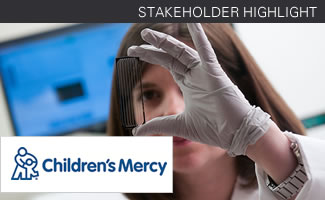
Known for its innovative approach to genome sequencing, the Center for Pediatric Genomic Medicine at Children’s Mercy Kansas City has recently published a landmark study showing that a genome based diagnostic approach can directly impact patient care for children and infants with neurodevelopmental disorders (NDD).
The retrospective study, published in December 2014, specifically looked at 100 families with 119 children with NDD’s enrolled in the Children’s Mercy genomic sequencing diagnostic program.
 Eighty-five of these were families of ambulatory care clinic patients. The mean age of these patients was about 7 years. The remaining 15 were families of critically ill infants enrolled from the hospital’s neonatal or pediatric intensive care units.
Eighty-five of these were families of ambulatory care clinic patients. The mean age of these patients was about 7 years. The remaining 15 were families of critically ill infants enrolled from the hospital’s neonatal or pediatric intensive care units.
Sarah Soden, MD, Developmental Pediatrician and Associate Professor of Pediatrics at Children’s Mercy Hospital Kansas City (CMHKC), and Stephen Kingsmore, MB, BAO, ChB, DSc, FRCPath, Director, Center for Pediatric Genomic Medicine and Professor of Pediatrics, led the study at CMHKC.
The researchers used whole genome and whole-exome sequencing to diagnose pediatric monogenic disorders in 100 families affected by NDDs. In most cases, parent child trios were tested:
- A definitive molecular diagnosis was identified in 45 percent of the 100 NDD families.
- Of the fifteen families, whose infants were enrolled from intensive care units, seventy-three percent received a diagnosis with rapid-whole genome sequencing.
- Of the eighty-five families enrolled from ambulatory care clinics, forty percent received a definite molecular diagnosis; 39 with exome sequencing and one with whole genome sequencing.
- The researchers determined that if genome or exome sequencing had been reported at symptom onset for the ambulatory clinic children, a molecular diagnosis may have been made, on average, 77 months earlier.
- A change in clinical care or impression of the pathophysiology was reported in 49 percent of newly diagnosed families.
- Because this was a retrospective study, more research is needed to determine the long-term implications for clinical care and cost-effectiveness for these patients. Two prospective studies are already underway.
Based on this study’s results, the researchers concluded that sequencing the genomes or exomes of trios should become an early part of the diagnostic work-up for NDDs, and rapid sequencing should be extended to critically ill infants and children.